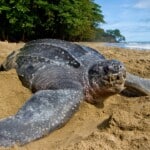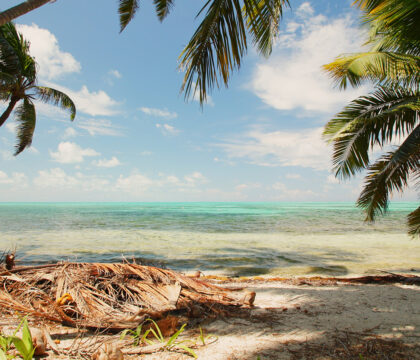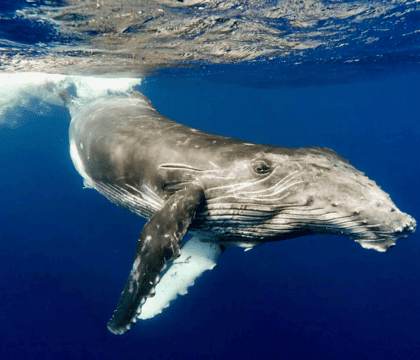March 31, 2025 • Program Updates
The bustling capital of Ghana became the backdrop for a powerful convergence of behavioral science and on-the-ground conservation as Oceanic Society and partners brought our innovative behavior change approach to the 43rd International Sea Turtle Symposium (ISTS) in Accra. For the first time in its 43-year history, the ISTS was held in Africa, offering an unprecedented opportunity for African and international sea turtle conservationists to come together, and we were keen to make the most of this gathering.
Building on momentum from previous workshops in Colombia (2023) and Thailand (2024), we co-hosted a training workshop titled “Creating Behavior Change Campaigns for Sea Turtle Conservation.” Organized as part of our work with Team BEACH, a partnership between Oceanic Society and Human Nature Group, and with support from the Association of Zoos and Aquariums’ Sea Turtle SAFE program, our goal was to arm on-the-ground sea turtle conservationists with the tools they need to go beyond raising awareness to achieve tangible human behavior changes that support sea turtle conservation.
Creating Behavior Change Campaigns for Conservation: Workshop & Training
Held on Saturday, March 22 in Accra, the Team BEACH workshop convened more than 40 people from over 20 countries, including 14 participants from throughout western Africa whose travel costs and participation were fully funded by Oceanic Society.
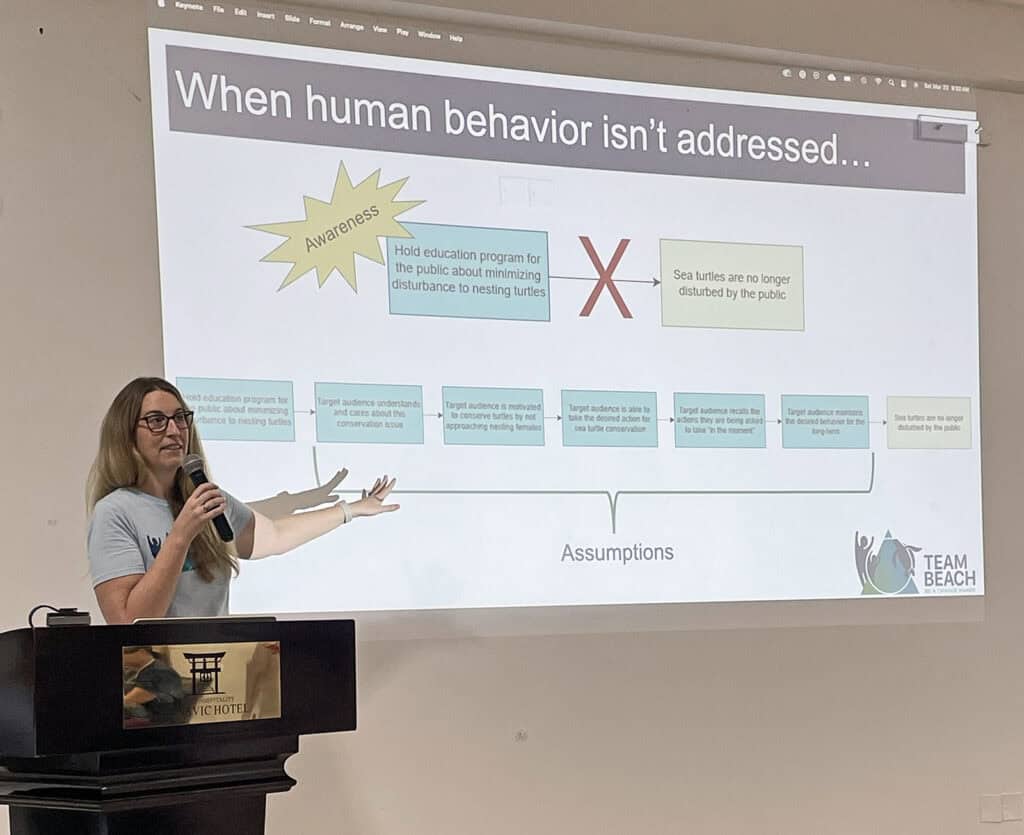
The workshop began with an in-depth overview of behavior change theory and Team BEACH’s framework, presented by Rachel Smith (Human Nature Group).
After an in-depth overview of behavior change theory and Team BEACH’s framework for designing and evaluating behavior change campaigns, we shifted to practical communications exercises and real-world case studies submitted by our network. Participants worked together in small groups to apply their new knowledge toward designing behavior change interventions for three specific conservation challenges in western Africa that were submitted by our network. The case studies were:
Organization: African Marine Mammal Conservation Organization (AMMCO)
Location: Limbe, Cameroon
Challenge: Bycatch
Focus: Working with fishermen to encourage safe handling and release techniques to reduce incidental mortality of turtles.
Organization: Nature Tropicale Ong (NTONG)
Location: Cotonou, Benin
Challenge: Coastal development and tourism impacts
Focus: Reducing impacts from coastal tourism, specifically artificial lighting, on nesting turtle beaches.
Organization: Ghana Instinct
Location: Cape Three Points, Ghana
Challenge: Direct take of turtles and eggs
Focus: Decreasing the amount of sea turtles and their eggs harvested by local communities.
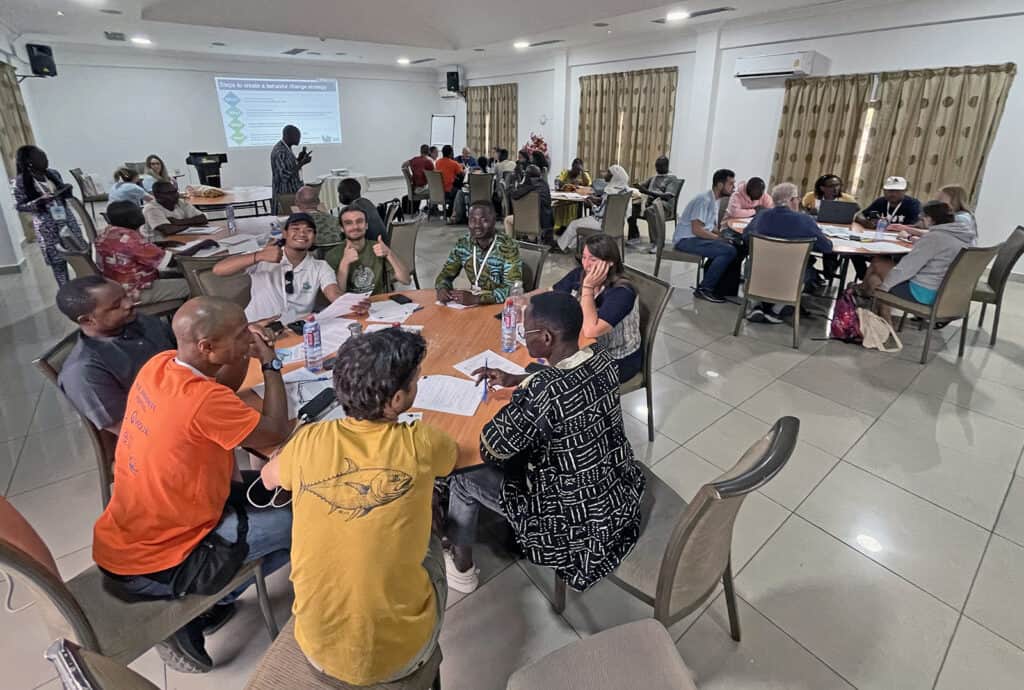
In small groups, participants applied their new knowledge to real-world case studies submitted by partners in western Africa.
Guided by a behavior change action plan template and with support of the workshop organizers, each group conducted an in-depth analysis of each case study—examining the core issues, target audiences, and behavioral science principles needed to develop effective and customized interventions. By the workshop’s end, attendees had gained valuable insights from behavior change experts and successfully applied these strategies to real-world challenges faced by sea turtle conservation professionals worldwide.
Building Regional Capacity Through Travel Grants
Not wanting to miss this incredible opportunity to build regional capacity for conservation, Oceanic Society proudly funded the participation of 14 sea turtle conservation practitioners from throughout western Africa who would otherwise have been unable to attend the meeting. We covered their roundtrip travel costs and conference registration, not only for the behavior change workshop, but for the entire weeklong ISTS with all of its learning and networking opportunities. Funded participants were:
Benin
- Marie Dossou-Bodjrènou: Nature Tropicale Ong
Cameroon
- Cedrick Fogwan Nguedia: African Marine Mammal Conservation Organization
Cabo Verde
- Herval Rosano Pereira Da Silva: Fundação Maio Biodiversidade
Democratic Republic of Congo
- David Angenda Mbuli: Institut Congolais pour la conservation de la Nature (ICCN)
Equatorial Guinea
- Francisco Mitogo Micha: Bioko Biodiversity Protection Program
Ghana
- Daniel Kwesi Botchwey: Environmental Justice Foundation (EJF)
- Emmanuel Gyekye: Keta Ramsar Center NGO
- Akwasi McLaren: Ghana Instinct NGO
- Solomon Yaw Kenyenso: Ghana Wildlife Society
Nigeria
- Edem Archibong Eniang: Biodiversity Preservation Center (BPC)
Republic of the Congo
- Louisette Ngounga: Renatura Congo
Togo
- Jacques Akiti: Agbo-Zegue Ong
- Mensah Akomedi: Agbo-Zegue Ong
- John Gaglo Kokou Toviho: Agbo-Zegue Ong
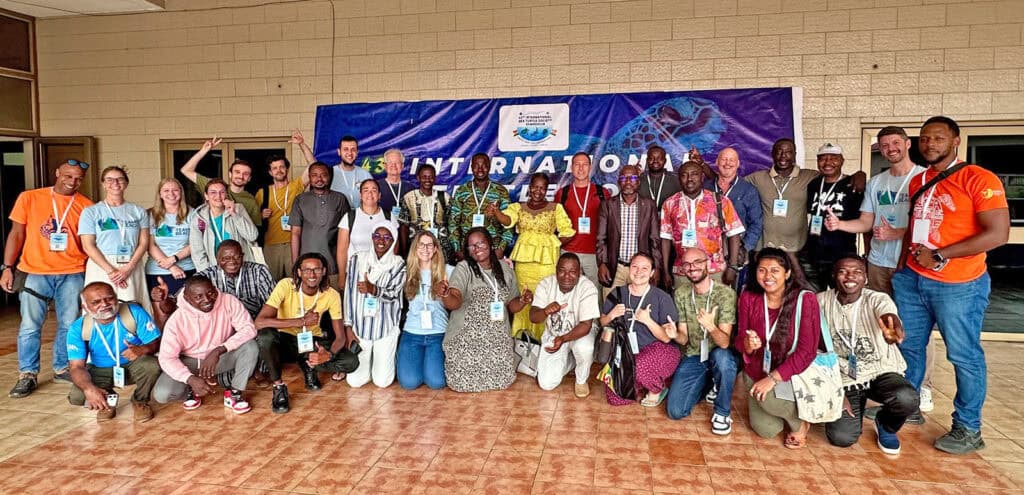
The Team BEACH workshop in Accra was attended by approximately 40 people from more than 20 countries, including 14 whose participation was fully-funded by Oceanic Society.
Beyond the Workshop: Creating Lasting Impact
The Accra workshop represents more than a single training event – it’s part of Team BEACH’s growing effort to transform how sea turtle conservation is practiced globally. By building a community of practitioners skilled in behavioral science applications, the initiative aims to create a multiplier effect, with each participant becoming a catalyst for more effective conservation in their home region.
Following the workshop, Team BEACH will maintain engagement with participants, providing ongoing support as they implement their newly developed strategies. The case studies examined during the workshop will be refined into comprehensive behavior change plans and shared across the Team BEACH network, creating valuable resources for the broader conservation community.
The Evolution of Team BEACH
What began as a partnership between the Oceanic Society, Human Nature Group, and Disney Conservation has evolved into a global movement connecting dozens of conservation practitioners across continents. Team BEACH continues to expand its reach and impact, creating a community of practice that transcends traditional boundaries between social and natural sciences.
By bringing together experts from diverse fields and regions, Team BEACH is demonstrating that effective sea turtle conservation requires understanding not just the biology of these magnificent creatures, but also the complex human behaviors that impact their survival. The Accra workshop represents another important step in this ongoing journey.
Learn more about Team BEACH here, and in our recent article: How Behavioral Science (and Team BEACH) Can Help Sea Turtles

